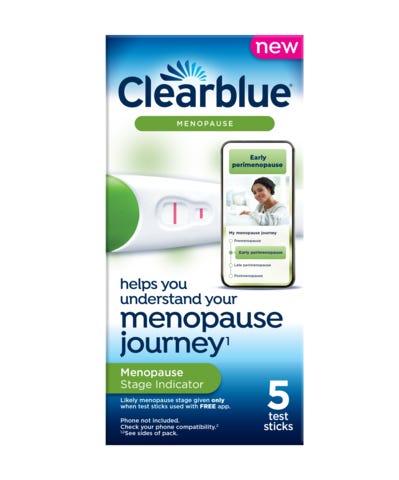Issue 20: Clue enters perimenopause | $4.24m for bladder care company Jude | False claims about fertility tests
+ lots more in your weekly FemTech and women's health innovation news.
Hi! Welcome to issue 20 of FutureFemHealth, here to bring you your weekly news about women’s health innovation and FemTech (w/c 4 September 2023).
🌟 Coming up today we’ve got:
🩸 My chat with Clue’s Chief Product Officer Rhiannon White
🧪 The misleading claims about at-home fertility tests
📌 Clearblue launches a menopause test
❤️ Bladder health company Jude scoops $4.24m seed funding
🔥 and more!
Got news to share from the world of FemTech and women’s health innovation? Let me know at anna@futurefemhealth.com
🩸 It’s official: most of us don’t have a Clue about menopause
Period tracker app Clue was one of the first ‘FemTech’ apps on the scene back in 2013 (as some will know, it was actually Clue’s co-founder and Chair Ida Tin who coined the term FemTech three years later).
Now, more than a decade on from launching as a period and cycle app, Clue has just launched a new ‘perimenopause mode’ which users can switch on within the app to help track symptoms and understand what’s going on with their bodies.
I got to chat to Clue’s Chief Product Officer Rhiannon White to find out more - and get her thoughts on the future of FemTech apps too!
Where did the idea for this new perimenopause mode come from for Clue?
From our users! We're pretty vocal and engaged community and we just kept getting a lot of feedback around, ‘hey, I think things are changing. Could you do something to support me around this?’
We ran a survey and we were just flooded with responses. Over 26,000 in 24 hours! 90% of people were saying they didn't feel well-informed [about perimenopause]. Only six percent had any information from healthcare providers. And then 70% said it's just not discussed openly in their families.
What are your hopes for this new feature?
We’re so excited for this, it really is only the beginning. We want to work carefully and thoughtfully with our users because it's such an intimate space and there's a lot of emotions tied up in this phase.
We want to be useful - and I can’t wait to do more data visualisation, more interactive content. We’re really about supporting people to take charge of their reproductive health.
We have this really strong belief that tracking equals data and insight; and then insight equals agency. And all that we want as adults in this world is to have agency - and health agency is the most important thing.
It feels a natural fit for Clue to extend to perimenopause as your users have probably grown up with the app. So is this the future of period apps now? Do you think we’ll see more incorporating perimenopause too?
100%. It all starts from period tracking in terms of the move into perimenopause, as that's where people start to notice the changes - and subtle changes as well.
There's the classics that you hear people talk about like hot flashes, but actually subtle changes happen a lot earlier than that, and they can go on for years not knowing or not understanding.
The best way to figure it out is to look at your own data and where you have already been tracking it.
And so that's why we are so passionate about providing this inside of period cycle tracker because so much of that early, early phase [of perimenopause] starts from the period.”
🗞️ Headlines
🛑 Websites that sell at-home fertility tests are making misleading claims
At-home hormone tests are big right now. And so is the debate about how helpful they actually are.
Now, a new study by the University of Sydney has revealed that at-home fertility tests may not live up to their marketing claims.
Researchers examined 27 websites across seven countries selling Anti-Mullerian Hormone (AMH) tests, often dubbed the 'egg timer' test for ovarian reserve.
But, since AMH is just one measure it can never really be a true predictor of your fertility levels, the time you might enter menopause or your chances of getting pregnant (which of course will depend on so many other factors, such as the quality of sperm!)
Yet, shockingly, 75% of the websites falsely claimed the test was a way of getting information about fertility or likelihood of conceiving.
A majority of websites also claimed that the test could indicate the onset of menopause or women at risk of premature menopause.
The big issue here is that people might take these tests and use this information to make decisions about their contraception choices, conception plans, or may pursue IVF or egg freezing thinking that they are ‘running out of time’.
While information is power - it also needs interpretation by a professional and proper context otherwise it can cause unnecessary anxiety and stress, or a false sense of reassurance.
The study also points out that healthcare professionals are often placed in difficult situations when patients come to them asking for fertility help based on these tests. The burden is then on them as they try to dispel the misconceptions caused by the websites.
That’s why the researchers are now calling for more regulation and oversight of the marketing of home fertility tests.
(Source: University of Sydney and JAMA network)
🛑 Clearblue launches new at-home ‘menopause test’
Speaking of at-home tests, we now have a new ‘menopause test’ from leading pregnancy test makers Clearblue.
The new menopause test measures the level of follicle-stimulating hormone (FSH) over a ten-day period.
And so once again, context for these sorts of test is key. As Dr. Samantha Dunham, co-director of the center for midlife health and menopause at NYU Langone Health, comments:
“These numbers always have to be interpreted in the context of the patient, and not just as a plus-minus test.
“A pregnancy test is a plus-minus test—you’re pregnant or you’re not. FSH is not a plus-minus test.”
And that, I think is going to be the challenge here. Undoubtedly the long-standing ‘halo effect’ of the established Clearblue brand will mean that customers will expect the menopause tests to work in the same way as the pregnancy test.
However, as Dr Heather Hirsch (who has teamed up with Clearblue for this launch) emphasises, the whole point is to use this test as part of building a picture of your health:
She says:
“The menopause transition can lead to an array of different and frustrating symptoms that can make women feel confused, but having a diary log of symptoms, cycle history, and the results from the FSH tests will certainly help clinicians make a more accurate diagnosis and start the dialogue of safe and available treatment options if appropriate.”
(Source: Time magazine and Business Wire)
💰 Funding, deals and investment news
📌 Bladder health company Jude scoops $4.24m seed funding. Congratulations to founder Peony Li and her team at London-based Jude. The start-up, which launched in January 2022, currently sells bladder strength supplements, absorbent pants, liners and pads, but now plans to grow its range of support and expand to the US. Jude is at the forefront of shaping a market for ‘bladder care’ (their messaging emphasises bladder care, not weakness) with products that appeal to all ages and stages of life. Heavily community-based too, constant feedback from their customers is helping them rapidly shape new products and services. (Source: TechCrunch)
🌟 More news from this week
📌 Daye opens period pain clinic. Daye’s world-first period pain clinic is now open - and you can get a free period pain report in just 10-15 minutes with personalised pain-relief recommendations. (Source: Daye)
📌 Fertility in the workplace: A growing issue for employers. A helpful look at the global landscape of fertility support in the workplace - plus the challenges and choice of solutions. (Source: Phys.org)
📌 How machine learning models can amplify inequities in medical diagnosis and treatment. Researchers at MIT are working on whether it’s actually possible for machine learning models to work in an unbiased way for everyone when it comes to healthcare. Spoiler - nope, not yet. (Source: MIT News)
🩸 Research and women’s health news
📌 FDA advances reproductive health care: An analysis of the impact of the recent FDA decisions about the OTC birth control pill and the pill for post-partum depression and what the future may hold. (Source: CNET)
📌 Nearly one in two Australian women experienced pelvic pain in last five years: A new report highlights the prevalence of pelvic pain among Australian women. (Source: Women's Agenda)
📌 UK: Call for support - new study: The NHS Confederation’s health economics strategic policy team is planning a national report focused on the relationship between investment in women's health and wider economic growth. Do you an organisation that might be able to help fund the report? Reach out to Bridget Gorham.
That’s all for this week!
See you next time,
Anna
PS Tomorrow night (Thurs 7 Sept) I’m off to the FemTech Lab Autumn cohort celebration in London. (Free) ticket info here. Let me know if you’re going - I’d love to say hi!






